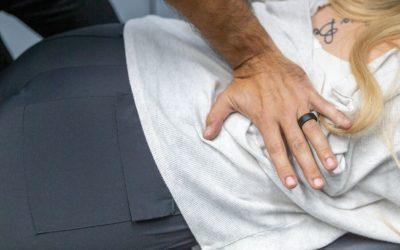
Do I Need to Hear Popping and Cracking during a Chiropractic Adjustment?
- posted: Apr. 14, 2022
You might wonder what to expect as you consider your first chiropractic adjustment. You’ve likely seen videos of adjustments with an abundance of loud pops and cracks. However, chiropractic care comes with various techniques that produce different results.
Do All Chiropractic Adjustments Make a “Crack” or “Pop” Sound?
Certain adjustments release nitrogen oxide, creating a “pop” sound. During your adjustment, tiny spaces open up in your joints, encouraging a release of pressure, thus allowing enough space for the gas to escape. This satisfying noise is called joint cavitation.
So, does the popping sound mean the chiropractic adjustment accomplished something? In short, no. The effectiveness of your adjustment relies on the skills of your chiropractor. However, the popping sound also doesn’t mean something went wrong.
The noises you hear during chiropractic treatment depend on the technique used. For example, some techniques cause a cracking sound, and others don’t, but both can be highly effective, depending on your needs.
So, whether you hear an abundance of pops or none at all, you don’t need to worry. Instead, discuss the methods used with your chiropractor, and you’ll better understand what to expect during your adjustment.
What Causes Popping or Cracking during Chiropractic Treatment?
Chiropractic patients sometimes assume the popping sound represents bones popping in and out of place, cracking, or tissue snapping. However, the truth isn’t that dramatic. Instead, nitrogen oxide produces the sound you hear during a chiropractic adjustment.
As Dr. Kyle Smerglia of Smerglia Chiropractic explains, “It literally just means that you’ve released nitrogen oxide from that joint. A lot of times, that’s just the buildup and pressure within that joint.”
If your chiropractor uses low-force techniques or specific equipment, you may not hear cracking or popping. For example, your chiropractor may use an activator. This instrument allows them to scan your spine and slowly move the bones. Although very effective for spinal adjustment, this gentle technique won’t create a satisfying popping sound.
In general, chiropractors feel your bones and joints to identify a lack of movement. Then, they make adjustments to generate movement in those areas. Whether or not you hear a “pop” does not correlate with the creation of joint movement.
What Should I Expect from a Chiropractic Adjustment?
If you haven’t had an adjustment before, you might wonder how you’ll feel during and after your appointment. The experience mainly depends on your chiropractor and what techniques they use.
Dr. Kyle Smerglia of Smerglia Chiropractic explains, “We are hands-on. We do create popping and cracking….During the adjustment, you’re going to feel the segments shifting. You’re going to feel some pressure releases as that nitrogen oxide is released. You’re going to feel things loosen up, move around.”
How you feel after the appointment depends on what symptoms you experienced that day. For example, if you had significant adjustments, you might experience some soreness or aches when you leave. Also, your muscles may tighten up or resist the adjustment slightly.
This isn’t due to toxins leaving the body, as some patients assume. Instead, you may feel a brief dizzy or lightheaded feeling due to your body’s natural release of chemicals and hormones.
However, any soreness or lightheadedness shouldn’t last long. On the other hand, many patients feel immediate relief after their adjustment.

Man holds a hand on pain neck.
When Is Neck Cracking Bad for You? Is Cracking Your Neck Dangerous?
You’ve probably twisted your chin to crack your neck joints if you enjoy the release and “pop” of adjustments. But have you ever wondered if this can cause damage? While a neck crack sound itself doesn’t pose a threat, improperly performing adjustments can result in injury.
If you watch a chiropractor perform a neck adjustment, you likely won’t see just twisting. Instead, they’ll perform small twists combined with side bends. The bend to the side locks out the joints to protect you from injury during the chiropractic adjustment. So, when you simply twist your head to the side for a quick neck crack, you could potentially harm yourself.
Keep in mind that basic stretches with a natural range of motion likely won’t cause damage. However, these satisfying “cracks” that most of us perform won’t provide much long-term relief.
Is “Popping” Your Joints Harmful? Will It Cause Arthritis?
You’ll often see people popping their knuckles, which has led to the old wives’ tale of joint popping causing arthritis. However, no matter what joint you pop, you simply release nitrogen oxide. So those daily knuckle pops won’t show up later in life as arthritis.
Keep in mind that excessive popping could cause minor ligament laxity. However, the average person won’t experience any health issues from joint popping.
Leave It to the Professionals
Many people pop their joints for temporary relief. However, to address the root cause of the discomfort, you should leave it to professionals. Licensed chiropractors receive extensive training to provide proper alignment. Though their quick movements and techniques may appear easy to try at home, you risk injuring yourself.
Similarly, though you may quickly identify where your body hurts, you might not be able to determine if the pain comes from a muscle, tendon, or ligament inflammation. When you consult with a chiropractor, they’ll assess your pain and create a strategic plan to address it holistically.
Are you ready to experience the relief of chiropractic care? At Smerglia Chiropractic, we pride ourselves on providing the finest chiropractic and wellness care to every patient. We employ many non-invasive treatment options to provide pain relief. Reach out today to learn more about how we can help you improve and maintain your spinal health.

Do I Need to Hear Popping and Cracking during a Chiropractic Adjustment?
- posted: Apr. 14, 2022
You might wonder what to expect as you consider your first chiropractic adjustment. You’ve likely seen videos of adjustments with an abundance of loud pops and cracks. However, chiropractic care comes with various techniques that produce different results.
Do All Chiropractic Adjustments Make a “Crack” or “Pop” Sound?
Certain adjustments release nitrogen oxide, creating a “pop” sound. During your adjustment, tiny spaces open up in your joints, encouraging a release of pressure, thus allowing enough space for the gas to escape. This satisfying noise is called joint cavitation.
So, does the popping sound mean the chiropractic adjustment accomplished something? In short, no. The effectiveness of your adjustment relies on the skills of your chiropractor. However, the popping sound also doesn’t mean something went wrong.
The noises you hear during chiropractic treatment depend on the technique used. For example, some techniques cause a cracking sound, and others don’t, but both can be highly effective, depending on your needs.
So, whether you hear an abundance of pops or none at all, you don’t need to worry. Instead, discuss the methods used with your chiropractor, and you’ll better understand what to expect during your adjustment.
What Causes Popping or Cracking during Chiropractic Treatment?
Chiropractic patients sometimes assume the popping sound represents bones popping in and out of place, cracking, or tissue snapping. However, the truth isn’t that dramatic. Instead, nitrogen oxide produces the sound you hear during a chiropractic adjustment.
As Dr. Kyle Smerglia of Smerglia Chiropractic explains, “It literally just means that you’ve released nitrogen oxide from that joint. A lot of times, that’s just the buildup and pressure within that joint.”
If your chiropractor uses low-force techniques or specific equipment, you may not hear cracking or popping. For example, your chiropractor may use an activator. This instrument allows them to scan your spine and slowly move the bones. Although very effective for spinal adjustment, this gentle technique won’t create a satisfying popping sound.
In general, chiropractors feel your bones and joints to identify a lack of movement. Then, they make adjustments to generate movement in those areas. Whether or not you hear a “pop” does not correlate with the creation of joint movement.
What Should I Expect from a Chiropractic Adjustment?
If you haven’t had an adjustment before, you might wonder how you’ll feel during and after your appointment. The experience mainly depends on your chiropractor and what techniques they use.
Dr. Kyle Smerglia of Smerglia Chiropractic explains, “We are hands-on. We do create popping and cracking….During the adjustment, you’re going to feel the segments shifting. You’re going to feel some pressure releases as that nitrogen oxide is released. You’re going to feel things loosen up, move around.”
How you feel after the appointment depends on what symptoms you experienced that day. For example, if you had significant adjustments, you might experience some soreness or aches when you leave. Also, your muscles may tighten up or resist the adjustment slightly.
This isn’t due to toxins leaving the body, as some patients assume. Instead, you may feel a brief dizzy or lightheaded feeling due to your body’s natural release of chemicals and hormones.
However, any soreness or lightheadedness shouldn’t last long. On the other hand, many patients feel immediate relief after their adjustment.

Man holds a hand on pain neck.
When Is Neck Cracking Bad for You? Is Cracking Your Neck Dangerous?
You’ve probably twisted your chin to crack your neck joints if you enjoy the release and “pop” of adjustments. But have you ever wondered if this can cause damage? While a neck crack sound itself doesn’t pose a threat, improperly performing adjustments can result in injury.
If you watch a chiropractor perform a neck adjustment, you likely won’t see just twisting. Instead, they’ll perform small twists combined with side bends. The bend to the side locks out the joints to protect you from injury during the chiropractic adjustment. So, when you simply twist your head to the side for a quick neck crack, you could potentially harm yourself.
Keep in mind that basic stretches with a natural range of motion likely won’t cause damage. However, these satisfying “cracks” that most of us perform won’t provide much long-term relief.
Is “Popping” Your Joints Harmful? Will It Cause Arthritis?
You’ll often see people popping their knuckles, which has led to the old wives’ tale of joint popping causing arthritis. However, no matter what joint you pop, you simply release nitrogen oxide. So those daily knuckle pops won’t show up later in life as arthritis.
Keep in mind that excessive popping could cause minor ligament laxity. However, the average person won’t experience any health issues from joint popping.
Leave It to the Professionals
Many people pop their joints for temporary relief. However, to address the root cause of the discomfort, you should leave it to professionals. Licensed chiropractors receive extensive training to provide proper alignment. Though their quick movements and techniques may appear easy to try at home, you risk injuring yourself.
Similarly, though you may quickly identify where your body hurts, you might not be able to determine if the pain comes from a muscle, tendon, or ligament inflammation. When you consult with a chiropractor, they’ll assess your pain and create a strategic plan to address it holistically.
Are you ready to experience the relief of chiropractic care? At Smerglia Chiropractic, we pride ourselves on providing the finest chiropractic and wellness care to every patient. We employ many non-invasive treatment options to provide pain relief. Reach out today to learn more about how we can help you improve and maintain your spinal health.
